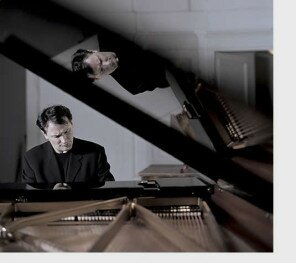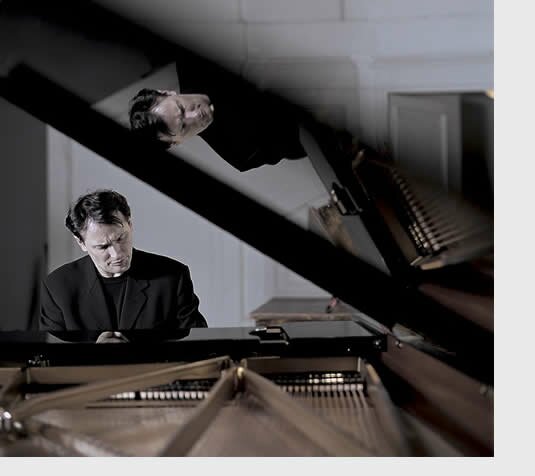
Pianist Christopher O’Riley, host of NPR’s popular national program From the Top (which introduces gifted young musicians), brought his own talents Tuesday night to UW’s President’s Piano Series at Meany Theater. He gave a program of Liszt transcriptions of works by Berlioz, Schubert, Schumann, Wagner and Mozart. (Next up is Georgian Khatia Buniatishvili on March 6, playing Chopin, Ravel, Schubert, and Stravinsky.)
All in all, this was a deeply disappointing concert.
There’s no doubt about O’Riley’s ability. There were beautiful moments of thoughtful touch, sensitive phrasing, fine technique throughout, but in fast, dense and loud passages—and Liszt loved these and inserted them as major portions of his compositions—O’Riley tended to go overboard and the results often were not as clean as they might have been.
He opened the program with Liszt’s lengthy transcription of the entire Symphonie Fantastique of Berlioz. In its orchestral form, Berlioz shows his mastery of timbres in expressing the atmospheric eeriness of his symphony through the different instruments. It’s a complex work with many threads which in a good orchestral performance remain sufficiently delineated for listeners to hear the details.
Liszt worked at a disadvantage here, as the piano has only one timbre. However, Liszt used, for choice, an Erard piano from the 1850s. This was a piano with much less tension than today’s concert grand. No metal bracing was needed to hold the piano’s shape together as is essential in today’s instrument, and the keyboard touch was much lighter, its sound decay shorter and the volume less loud. Liszt wanted the touch lighter still, and he had the mechanism altered to a hair-trigger sensitivity to help create more musical clarity in his furious onslaughts of notes. Even so, he left disabled pianos strewn behind him post-concert on many stages.
Playing Liszt’s Berlioz transcription leaves the modern pianist at a double disadvantage—both the single timbre, and the much heavier touch. O’Riley’s performance was often loud to over-loud, incredibly fast and dense, but instead of coming out clearly with an exciting sound and shape, there was little clarity, and his performance didn’t bring into relief the madness of the symphony’s essence as it warred with the saner moments. There was more frenzy, no nuance here, and unfortunately, much too much of this, despite oases of gentler, sparer sections in which his playing sang.
This is a work which is more fun for the performer to achieve than for the listener. I felt battered at the end. Had this been the only work of this type on the program it would have been plenty.
O’Riley continued with a short transcription of a Schubert song, Frühlingsglaube, and one by Schumann, Frühlingsnacht, the latter full of scintillating passagework. Both came off well in O’Riley’s hands, and he followed them with the transcription of Wagner’s Liebestod from Tristan und Isolde. Here O’Riley’s touch was more nuanced, and the emotional side came through.
Reminiscences of Don Juan, from Mozart’s opera Don Giovanni, fared less well. The lowest register of the modern piano is much muddier than that on the early Erard, and creating the sounds of the Don’s nemesis, the Commendatore, requires those bottom notes. In this performance they had little of the menace of the original. And while the charming and lighter central section is replete with well known melodies from the opera, the ending is again an onslaught of notes at full volume in which O’Riley again missed out on any expression or anything except getting the notes. It seemed to this listener that his hands were tired by this point in the program.
Liszt transcriptions can be a pleasure to hear, but in this performance, they mostly weren’t. Why did O’Riley choose this program? It seemed unbalanced, too much performer gratification in the fun of playing these pieces — and not enough for the audience itself — with too little variety: not a good example for those young musicians he encourages so well on From the Top.
